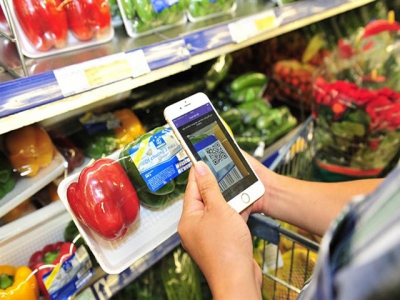Food safety in doubt even with QR labels

Ho Chi Minh City — It is not difficult to find meat, vegetables and fruits sold at supermarkets with quick response (QR) codes which help customers trace the origins and quality of their products.
A customer chooses food with quick response codes in a supermarket in District 1 in HCM City. The codes can be scanned by an app on a smartphone and give customers advice on whether they should pick up the products. — VNA/VNS Photo Hữu Khoa
The codes can be scanned by an app on a smartphone and give customers advice on whether they should pick up the products.
The application of technology in product traceability has demonstrated local authorities’ commitment to winning the trust of customers after a series of food contamination scandals across the country.
However, food experts have warned that food with QR codes might not be as reliably safe as it is supposed to be, while customers have raised doubt over the codes’ accuracy, dantri.com.vn reported
Mai Thanh Thúy, a housewife in HCM City, said the QR code labels could be faked. The labels might be removed from one package to be stuck on another package.
“I have never checked the codes to trace the products’ origin,” she told the newspaper. “I buy the products because I have the trust in them. That’s it.”
Another customer, Trần Thu Cúc, said, “We [customers] can scan the codes to know information but do not know if the labels are put on the right products or not.”
"The most important thing is that the process from planting to packaging, transportation and processing must be closely watched by responsible State agencies," she said.
According to food expert Đỗ Lan Nhi food processes such as Global Good Agricultural Practice (GAP) or VietGAP are checked and verified by independent agencies. However, not every single product manufactured under the Global GAP or VietGAP standardised processes can be tested for verification. Food manufacturing companies have to take responsibility for product quality.
A high-quality process does not always ensure high-quality products because there might be risks during the manufacturing process which lower product quality.
Taking advantage of the verified process, many companies verify their products by putting QR code labels on each package even though the food is not totally safe.
She added that the QR codes should provide information on the list of substances that could cause allergic reactions. Not many food products have this kind of information.
In addition to the QR codes found on meat, vegetables and fruits at supermarkets, pork products have quarantine labels.
According to Associate Professor Phạm Khánh Phong Lan, these labels do not ensure pork quality because low-quality pork without clear origins might be mixed and sold with high-quality pork to increase profits.
“In addition to tightening management of food input, manufacturing and processing facilities must act responsibly for the community’s health,” she said.
Related news
 Organic firms need to do research
Organic firms need to do research Companies interested in organic agriculture should engage in market research and brand building, and not just simply chase trends without having first identifie
 Passion helps woman’s start-up dream succeed
Passion helps woman’s start-up dream succeed Have you ever tried eating tomatoes like other kinds of fruit such as apples or grapes instead of just using it for cooking or making salads?
 Binh Thuan: Over 30 percent of dragonfruit land under VietGap
Binh Thuan: Over 30 percent of dragonfruit land under VietGap Since the start of this year, more than 10,000 ha of dragonfruit in the south central coastal province of Binh Thuan has been grown under VietGap standards